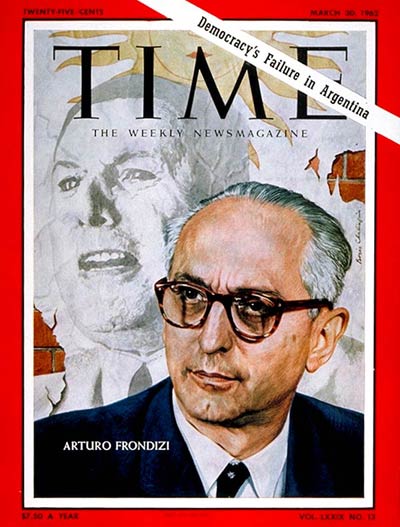That attention-grabbing headline could have been written about several periods of Argentine history in the 20th century but this particular instance is from the March 30, 1962 cover of Time magazine featuring a portrait of Arturo Frondizi, president of Argentina from 1958 – 1962. The cover story is titled Ghost from the Past, a reference to Perón.

In the post-Perón years of the late 1950s there was a lot of economic and political strife with the military closely watching and hampering Frondizi’s function as president. The focus of the Time magazine article is the 1962 congressional and gubernatorial elections that were won by the Peronists in a landslide. The military wanted Frondizi, who had opened the doors for the Peronist party return to politics, to annul the election.
Time Magazine writes about the events with a quality of prose generally missing from today’s mainstream news publications. Too bad the actual writer of the article isn’t credited with a byline:
For hours on end, a solitary figure sat stiffly in an ornate office in Buenos Aires’ presidential Casa Rosada. A few lifelong personal friends kept an uncomfortable vigil in an ivory and green anteroom. Outside the door, a pair of knee-booted grenadiers of the palace guard stood, like life-sized toys, with ceremonial sabers bared. A stream of messengers came and went, bearing bulletins. Arturo Frondizi, 53, President of Argentina and currently his country’s most unpopular man, was waiting to see whether he would be allowed to remain as elected Chief Executive of South America’s second biggest nation.
There are a few editorial interjections that color the article as an artifact from the U.S. perspective such as the constant pairing of the word dictator alongside the name of Juan Perón and the reference to “Che Guevara’s Red mother Celia” showing up at a Peronist rally. Time also couldn’t help but point out that the sixty-six year old Perón (as of 1962) “lives in luxurious exile with his two poodles and 27-year-old Isabel”, foreshadowing another calamitous presidency.
What’s not mentioned in the article, occurring just after the magazine had gone to print, was the arrest of Frondizi by the military.
The article does raise the intriguing question: how did the military, which had not fought a war since 1870, control Argentina for much of the 20th century?
December 18th, 2007 at 4:26 pm
A partial answer to your question (to paraphrase, “How could the Argentine military so strongly influence the course of Argentine history?”) lies in the dominant place that government, particularly the federal government, holds in Argentina. Additionally, Latinate countries lack the deeply seated tradition of, say, the North American or British military in keeping aloof from politics.
I hate to say it, but another partial answer lies in Argentine restrictions on the private possession and use of arms.